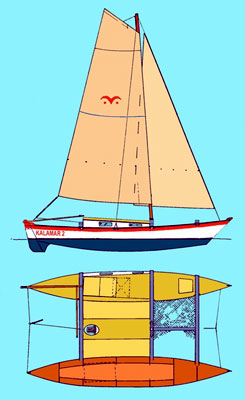Sunday, January 18, 2015
The Wharram Tiki 21 Catamaran

I decided to go back to a simpler kind of sailing for 2006 after loosing Intensity, my Grampian 26 monohull cruiser to Hurricane Katrina in 2005. Ive long been fascinated with James Wharram catamarans and built one of his smallest designs the Hitia 17 beachcruiser, back in 1997-98. (See a photo and description here) I had originally planned to build one of his Tiki 26 or Tiki 30 cruising catamarans, but instead bought the Grampian 26 and put most of my time and energy for a few years into refitting and cruising on it. The disadvantages of a deep-draft keel boat have long been apparent to me, and the lack of truly safe harbors on the Mississippi coast when a hurricane threatens is definitely one of those disadvantages.
Most multihulls are shallow draft, and Wharram catamarans are designed to really take advantage of this feature, with hull forms that require no underwater appendages such as centerboards or daggerboards to enable them to sail to weather. They can dry out on a falling tide and even the bigger ones can be sailed right up to the beach. Although I have the building plans for the Tiki 26 and have long thought this was one of the most practical sizes for my needs, shortly after Katrina wrecked the Gulf coast I purchased a used Tiki 21 from a couple in Ocean Springs. The price was right and the catamaran came with a galvanized trailer. Trailerability was especially important to me with most of the marinas on the coast wiped out. I could bring the boat inland for a complete refit and take it back to the coast after some of the clean-up and rebuilding was done.
The Tiki 21 is an excellent beachcruiser style of boat. While too small to live aboard in the conventional manner, it does have a dry sea berth in each hull to make longer passages possible, and the expansive bridgedeck between the hulls makes a great platform to pitch a tent once the boat is anchored for the night. Although small, the Tiki 21 is a proven offshore passagemaker. It was designed as a coastal cruiser by James Wharram in the early 1980s and was never intended for long ocean passages. Despite this, a young man named Rory McDougall built one in Devon, England and left in 1991 bound for New Zealand. He eventually sailed on around the world, making the Tiki 21 the smallest catamaran in history to circumnavigate. He returned from the voyage enthusiastic about the boat, and continued to use it for shorter trips, with no desire to acquire a larger one.
It takes a different sort of mentality to voyage that far on such a small, mostly open boat, but Rorys completion of the trip shows what is possible. As he said, his boat would be considered luxurious by the standards of the ancient Polynesian voyagers whose craft were Wharrams design inspiration. Having traveled far in much smaller boats (namely canoes and sea kayaks), Im familiar with the concept of simplicity and the advantages of carrying less and using less in the way of complex systems. The Hitia 17 that I built years ago was at the time my idea of a perfect small cruiser, but its primary limitation was that there was no secure place anywhere on board to sleep while underway or to get out of the weather if caught out in bad conditions. Its also a bit limited in load carrying capacity for longer trips, where as the Tiki 21, with a capacity of 1,000 pounds, should have a good range for singlehanding, with room for everything one needs for this elemental form of cruising.
It seems to me that this boat, with its shallow draft of just 14 inches, stability and seaworthieness of its deeply flared V-hulls with an overall beam of 12 and its cruising speed of up to 10-12 knots in the right conditions, will be ideal for exploring the islands and estuaries of the Gulf coast. I can also envision cruising it among the far-flung mangrove cays of the Florida Keys and the Everglades, having a comfortable camping platform for overnight stops away from the mosquitoes and no-see-ums of the beach. A voyage across the Gulf Stream to cruise the Bahamas is certainly within its capacity for one willing to put up with a little discomfort, and such a trip is one of my goals for this boat. Wharram catamarans are being built and sailed throughout the world, and many resources are avaiblable on the Internet for those interested in these boats. The best place to start is at the source itself: www.wharram.com for information on all the designs available. As I complete the refit and modifications of my Tiki 21, I plan to post photos and commentary here for all who are interested.
This article was first published on Element: A Wharram Tiki 21 Catamaran on 3-1-2006
Subscribe to:
Post Comments (Atom)
No comments:
Post a Comment